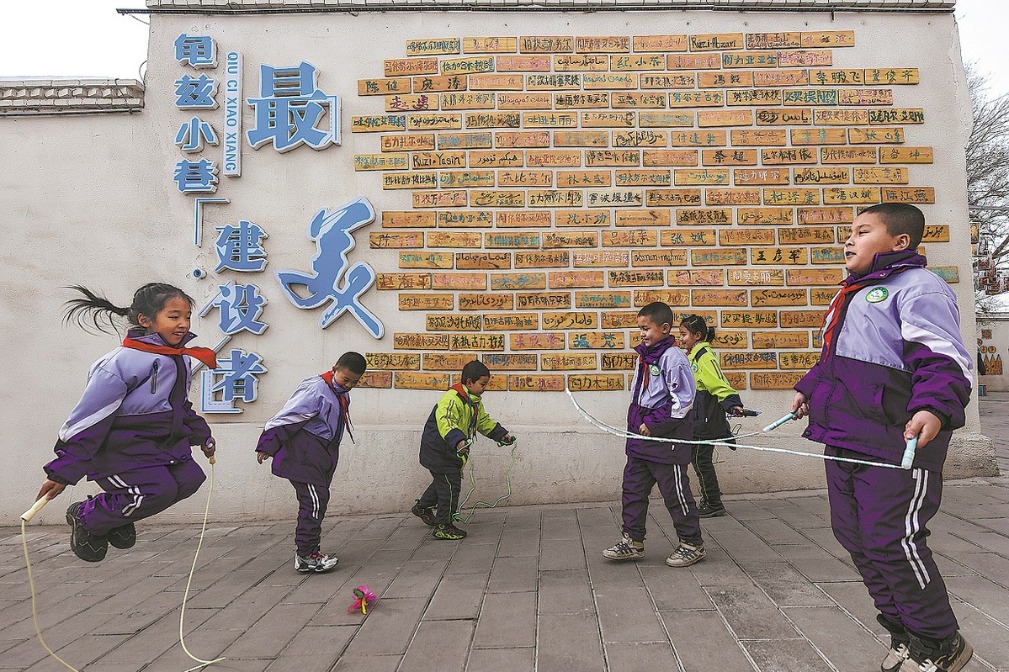Firms to see costs drop as real economy gets inclusive finance spur


Business loans will become cheaper in move to help low-income earners
By the end of the third quarter this year, financing costs for microbusinesses will be substantially reduced as the State Council, China's Cabinet, promotes inclusive finance to advance the real economy and poverty relief.
The decision was made at a State Council executive meeting, which was presided over by Premier Li Keqiang on April 25. Experts said the push for inclusive finance will be beneficial to small and micro-sized enterprises with possibly lower costs when they apply for and get loans.
Inclusive finance covers services offered by financial institutions specifically to micro-businesses, farmers, those on a low-income in urban areas, the poor, people with disabilities and the elderly.
Figures showed that medium and large-sized commercial banks around the country have set up inclusive finance departments and had granted loans of more than 3.4 trillion yuan ($536 billion) by the end of last year.
In the next step, assessment standards will be made for banks based on their operations in inclusive finance, with efforts to accelerate building systems for supportive services and credit information, said a statement released after the meeting.
Banks will be supported in making specific plans on inclusive-finance loans and setting up incentive funds, the statement said. Innovation will be encouraged for operations such as mid and long-term fixed asset loans for small and micro-businesses, mortgages for new agricultural businesses and financing for poverty relief, it said.
Over the past few years, small businesses were confronted with the difficulty of getting financing as well as higher costs than those for large or State-owned enterprises. To boost economic growth and employment, more financial support should be given to these entities.
The meeting was also the latest move adopted by the central government to promote this form of finance.
In his Government Work Report on March 5, the premier said China's financial service system will be reformed and the government will support financial institutions to expand inclusive finance.
The premier said at the meeting that incentive mechanisms should be established and improved to stimulate enthusiasm inside banks for inclusive finance, and supervision and audits should be strengthened as well.
For commercial banks, inclusive finance may see lower profits, higher risks and costs, compared with other loans, said Zeng Gang, director of the banking research department at the Institute of Finance and Banking at the Chinese Academy of Social Sciences. Therefore, their participation should be boosted with supportive policies, including assessments and incentives, he said.
By 2020, banking and insurance services will be set up in rural areas, with 95 percent of farming households taking part in agricultural insurance, according to a five-year plan on inclusive finance released by the State Council in May last year.
Apart from small and micro-businesses, agriculture and rural residents are also key targets for inclusive finance, said Wang Shuguang, a professor at the School of Economics at Peking University. Many counties don't have a structured financial system and innovation should be encouraged to coordinate all financial resources to lead more private capital to rural areas as a way to promote inclusive finance, he said.
Dong Ximiao, a visiting researcher at Chongyang Institute for Financial Studies at Renmin University of China, said the policies are expected to help financial institutions better serve the real economy with more support offered to small and medium-sized enterprises and the agricultural sector.
In addition to policies released after the meeting, certain taxes should be reduced to endorse inclusive finance and a government-led microcredit guarantee should be established to reduce risks for financial institutions, Dong said.
Meanwhile, rural areas should build a credit system to suit a higher level of loans and repayments, he said. By these means, more capital will possibly enter the inclusive finance sector, he said.
Multiple measures should be taken to promote the development of inclusive finance, and related governmental departments should cultivate an inviting environment for financial institutions to reduce the financing costs for micro-businesses, Li said at the meeting.
Third-party evaluations should be conducted to check the implementation of these policies, and the key is to make micro-businesses feel the difference, the premier added.
huyongqi@chinadaily.com.cn
- Zhangye's desert oasis dazzles in early summer
- Coastal areas prepare for year's first typhoon
- Remains of former senior Chinese legislator Ragdi cremated
- Math prodigy's social media appearance sparks concern
- It's a purple world
- Global professionals gather in Macao to drive high-level infrastructure connectivity





































